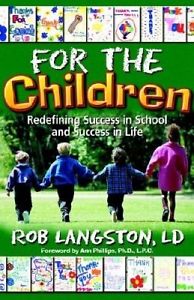 Today's book rec comes from Susie, who suggests that the beginning of the school year is always a great time to review your goals to work as a team with you child's teachers, school administrators, or IEP team members. There can be many barriers, but there can also be many successes. Clear communication, goals, and expectataions along with a positive outlook are keys to success. After all, everyone has the same goal: to get your child the best educational opportunities possible.
To that end Rob Langston's For the Children: Redefining Success in School and Success in Life is worth taking a look at. With so many messages from schools, from home, from media, and from research, and from society in general, sometimes it's hard to know "how to be." The author's Amazon page notes, "In this book I tell you about my struggles and accomplishments as a child and an adult with Dyslexia, with the hope that it will give you the strength and encouragement to help yourself or a loved one. I strongly urge you to read this book and apply it to your life. Don't ever give up on your dreams and always believe in yourself." Read more here.
Today's book rec comes from Susie, who suggests that the beginning of the school year is always a great time to review your goals to work as a team with you child's teachers, school administrators, or IEP team members. There can be many barriers, but there can also be many successes. Clear communication, goals, and expectataions along with a positive outlook are keys to success. After all, everyone has the same goal: to get your child the best educational opportunities possible.
To that end Rob Langston's For the Children: Redefining Success in School and Success in Life is worth taking a look at. With so many messages from schools, from home, from media, and from research, and from society in general, sometimes it's hard to know "how to be." The author's Amazon page notes, "In this book I tell you about my struggles and accomplishments as a child and an adult with Dyslexia, with the hope that it will give you the strength and encouragement to help yourself or a loved one. I strongly urge you to read this book and apply it to your life. Don't ever give up on your dreams and always believe in yourself." Read more here.
Straight Talk About Reading by Moats & Hall
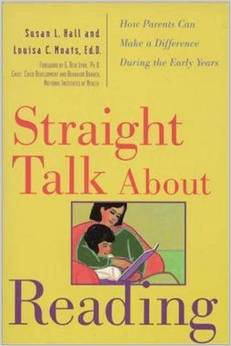 Today's book rec comes from Susie, whom you all know is a big believer in early intervention. While this book isn't designed specifically for children with dyslexia, it does detail accessible, easy-to-implement tips for basic reading and spelling skills that can compliment what your child experiences in school...and in some cases, may even help you identify early signs of dyslexia in your own child.
From Amazon's book page: "Today's parents are increasingly concerned about the reading and spelling skills taught in schools and are taking charge of their children's education. Full of ideas and suggestions--from innovative preschool exercises to techniques that older children can use to increase reading speed and comprehension--Straight Talk About Reading will instantly help any parent lay a solid foundation for their child's formative educational years."
Today's book rec comes from Susie, whom you all know is a big believer in early intervention. While this book isn't designed specifically for children with dyslexia, it does detail accessible, easy-to-implement tips for basic reading and spelling skills that can compliment what your child experiences in school...and in some cases, may even help you identify early signs of dyslexia in your own child.
From Amazon's book page: "Today's parents are increasingly concerned about the reading and spelling skills taught in schools and are taking charge of their children's education. Full of ideas and suggestions--from innovative preschool exercises to techniques that older children can use to increase reading speed and comprehension--Straight Talk About Reading will instantly help any parent lay a solid foundation for their child's formative educational years."
And from a thoughtful reviewer: "In today's world, reading is an essential component in a very competitive, highly technological society. More and more parents should be making efforts to advocate for quality reading programs in their schools. This book by Hall and Moats is a comprehensive guide for parents about current researched based practices in teaching reading. Susan Hall has traveled the road as a parent of a child who had difficulty learning to read. Louis Moats, Ed.D has extensive experience in the field of reading as an educator, researcher, consultant and writer. The book has been divided into three parts: 1. Background Information - all the information you need to make informed judgments and decisions about your child's reading instruction, whole language vs. phonics. 2. What Parents Can Do To Help Their Child - numerous explicit activities and games to support you child's progress in reading. 3. When Reading is Difficult - discussion about disabilities vs. poor instruction; learning disabilities and dyslexia."
Different Learners by Jane M. Healy
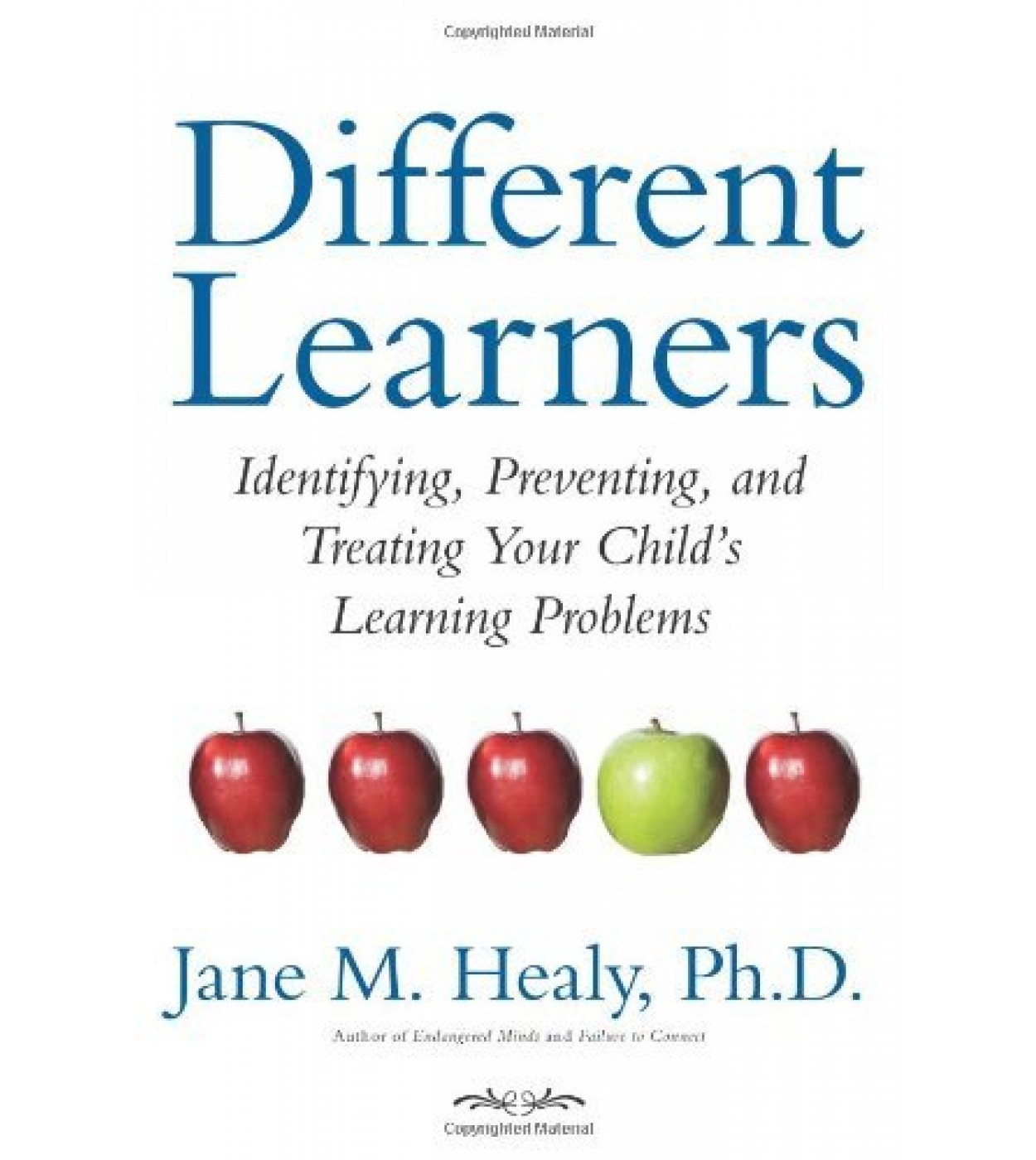 Part reference book, part testimonial, camp co-director Susie recommends the book Different Learners as a go-to guide for parents navigating the waters of a child's struggles in school. Whether social, classroom, or emotional differences arise, chances are good that author Jane M. Healy addresses them in her book.
From the Amazon book page: "Today’s fast-paced, stressed-out culture is hazardous to growing minds, says Healy, and a growing 'epidemic' of children’s disorders is the result. Different Learners offers a complete program not only for treating the child, but also for making more beneficial lifestyle choices at home and improving teaching techniques at school. It shows parents and caregivers how to prevent some learning difficulties from ever happening in the first place. It explains how to have your child evaluated if necessary, and, if a problem is found, how to evaluate various treatments. Different Learners explains how medications for attention and learning work in the brain and why they should not be the first step in most treatment programs. It shows how schools can actually worsen a child’s learning difficulties and how to make sure this doesn’t happen to your child. It even offers a program for 'brain-cleaning' that will help any child perform better in school."
Part reference book, part testimonial, camp co-director Susie recommends the book Different Learners as a go-to guide for parents navigating the waters of a child's struggles in school. Whether social, classroom, or emotional differences arise, chances are good that author Jane M. Healy addresses them in her book.
From the Amazon book page: "Today’s fast-paced, stressed-out culture is hazardous to growing minds, says Healy, and a growing 'epidemic' of children’s disorders is the result. Different Learners offers a complete program not only for treating the child, but also for making more beneficial lifestyle choices at home and improving teaching techniques at school. It shows parents and caregivers how to prevent some learning difficulties from ever happening in the first place. It explains how to have your child evaluated if necessary, and, if a problem is found, how to evaluate various treatments. Different Learners explains how medications for attention and learning work in the brain and why they should not be the first step in most treatment programs. It shows how schools can actually worsen a child’s learning difficulties and how to make sure this doesn’t happen to your child. It even offers a program for 'brain-cleaning' that will help any child perform better in school."
My Dyslexia by Philip Schultz
 We're especially excited about this book featuring dyslexia because it's written by a Pulitzer Prize winning poet. While all the parenting and teaching books we recommend are great resources, My Dyslexia is a memoir. In other words: sit back, relax, and enjoy this powerful, well-written story of one man's life with dyslexia and how, when his son was diagnosed, everything changed.
From the Amazon author page: "Despite winning the Pulitzer Prize for Poetry in 2008, Philip Schultz could never shake the feeling of being exiled to the 'dummy class' in school, where he was largely ignored by his teachers and peers and not expected to succeed. Not until many years later, when his oldest son was diagnosed with dyslexia, did Schultz realize that he suffered from the same condition. In his moving memoir, Schultz traces his difficult childhood and his new understanding of his early years. In doing so, he shows how a boy who did not learn to read until he was eleven went on to become a prize-winning poet by sheer force of determination. His balancing act—life as a member of a family with not one but two dyslexics, countered by his intellectual and creative successes as a writer—reveals an inspiring story of the strengths of the human mind."
We're especially excited about this book featuring dyslexia because it's written by a Pulitzer Prize winning poet. While all the parenting and teaching books we recommend are great resources, My Dyslexia is a memoir. In other words: sit back, relax, and enjoy this powerful, well-written story of one man's life with dyslexia and how, when his son was diagnosed, everything changed.
From the Amazon author page: "Despite winning the Pulitzer Prize for Poetry in 2008, Philip Schultz could never shake the feeling of being exiled to the 'dummy class' in school, where he was largely ignored by his teachers and peers and not expected to succeed. Not until many years later, when his oldest son was diagnosed with dyslexia, did Schultz realize that he suffered from the same condition. In his moving memoir, Schultz traces his difficult childhood and his new understanding of his early years. In doing so, he shows how a boy who did not learn to read until he was eleven went on to become a prize-winning poet by sheer force of determination. His balancing act—life as a member of a family with not one but two dyslexics, countered by his intellectual and creative successes as a writer—reveals an inspiring story of the strengths of the human mind."
Thinking Differently: An Inspiring Guide for Parents of Children with LD
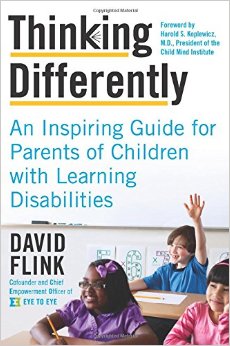 We recently became aware of Thinking Differently: An Inspiring Guide for parents of Children with Learning Differences written by David Flink. David is both dyslexic and has ADHD, and tells a humorous, informative story in this Dyslexic Advantage video. He wants to change the message about learning differences so that people come to believe that the problem isn't "in" the child or adult who learns differently...rather, the child or adult holds a gift within. "Disability, or this ability," David often says. We're on board!
From the Amazon summary page for David's book: "In Thinking Differently, David Flink, the leader of Eye to Eye—a national mentoring program for students with learning and attention issues—enlarges our understanding of the learning process and offers powerful, innovative strategies for parenting, teaching, and supporting the 20 percent of students with learning disabilities. An outstanding fighter who has helped thousands of children adapt to their specific learning issues, Flink understands the needs and experiences of these children first hand. He, too, has dyslexia and ADHD. Focusing on how to arm students who think and learn differently with essential skills, including meta-cognition and self-advocacy, Flink offers real, hard advice, providing the tools to address specific problems they face—from building self-esteem and reconstructing the learning environment, to getting proper diagnoses and discovering their inner gifts. With his easy, hands-on “Step-by-Step Launchpad to Empowerment,” parents can take immediate steps to improve their children’s lives. Thinking Differently is a brilliant, compassionate work, packed with essential insights and real-world applications indispensable for parents, educators, and other professional involved with children with learning disabilities."
We recently became aware of Thinking Differently: An Inspiring Guide for parents of Children with Learning Differences written by David Flink. David is both dyslexic and has ADHD, and tells a humorous, informative story in this Dyslexic Advantage video. He wants to change the message about learning differences so that people come to believe that the problem isn't "in" the child or adult who learns differently...rather, the child or adult holds a gift within. "Disability, or this ability," David often says. We're on board!
From the Amazon summary page for David's book: "In Thinking Differently, David Flink, the leader of Eye to Eye—a national mentoring program for students with learning and attention issues—enlarges our understanding of the learning process and offers powerful, innovative strategies for parenting, teaching, and supporting the 20 percent of students with learning disabilities. An outstanding fighter who has helped thousands of children adapt to their specific learning issues, Flink understands the needs and experiences of these children first hand. He, too, has dyslexia and ADHD. Focusing on how to arm students who think and learn differently with essential skills, including meta-cognition and self-advocacy, Flink offers real, hard advice, providing the tools to address specific problems they face—from building self-esteem and reconstructing the learning environment, to getting proper diagnoses and discovering their inner gifts. With his easy, hands-on “Step-by-Step Launchpad to Empowerment,” parents can take immediate steps to improve their children’s lives. Thinking Differently is a brilliant, compassionate work, packed with essential insights and real-world applications indispensable for parents, educators, and other professional involved with children with learning disabilities."
Deeper Learning: How 8 Innovative Public Schools Are Transforming Education in the 21st Century
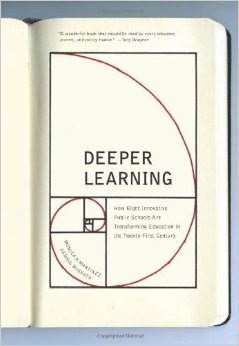 We're pretty excited about a book published this spring by The New Press, called Deeper Learning and thought we'd offer the basic info here. From their website:
"In Deeper Learning, education strategist Monica R. Martinez and sociologist Dennis McGrath take us inside eight schools that have set out to transform the experience of learning. In these schools, we meet teachers and students who show us just what 'Deeper Learning' looks like. The examples from these pages—from high school kids developing energy-saving solutions alongside engineers to young people discovering the complexities of sustainability on an oral history expedition to Appalachia—offer an inspiring and expanded vision of what’s possible in schools today. An accessibly written showcase of schools and practices designed to empower educators and students alike, here is a book for all who are concerned with the dual need for American schools to be genuinely innovative and to embrace what works. Deeper Learning demonstrates how students in their teen years can become passionate learners and global citizens ready to take on a world increasingly defined by new technologies, economic shifts, and profound social challenges."
We're pretty excited about a book published this spring by The New Press, called Deeper Learning and thought we'd offer the basic info here. From their website:
"In Deeper Learning, education strategist Monica R. Martinez and sociologist Dennis McGrath take us inside eight schools that have set out to transform the experience of learning. In these schools, we meet teachers and students who show us just what 'Deeper Learning' looks like. The examples from these pages—from high school kids developing energy-saving solutions alongside engineers to young people discovering the complexities of sustainability on an oral history expedition to Appalachia—offer an inspiring and expanded vision of what’s possible in schools today. An accessibly written showcase of schools and practices designed to empower educators and students alike, here is a book for all who are concerned with the dual need for American schools to be genuinely innovative and to embrace what works. Deeper Learning demonstrates how students in their teen years can become passionate learners and global citizens ready to take on a world increasingly defined by new technologies, economic shifts, and profound social challenges."
For example, as the book states: "A particularly vivid example of putting students in the driver’s seat of their own education is the way they handle what traditional schools refer to as parent-teacher conferences. At these time-honored encounters, it’s not uncommon for students to stay home while the adults discuss their progress or lack thereof. At schools built on Deeper Learning principles, the meetings are often turned into student-led conferences, with students presenting their schoolwork, while their teachers, having helped them prepare, sit across the table, or even off to the side. The triad then sits together to review and discuss the work and the student’s progress. The message, once again, is that the students are responsible for their own success."
Back to School Book Recs (for parents)
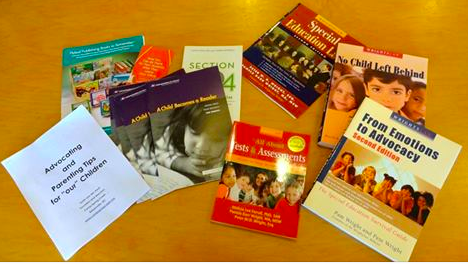 More than any other book about your rights, the rights of your child, and the roles of teachers and schools--this book, Tests & Assessments published by Wrightslaw--will get you through the ins and outs of the school year logistics. Susie recommends it highly. The founder of Wrightslaw, Pete Wright, even spent some time with us on the phone last year so that we could publish an interview with him on this blog. Learn more about his story from personal experience to Supreme Court by clicking the links. Pete's grandson also happened to go to camp this summer!
View additional book recs and research articles here.
More than any other book about your rights, the rights of your child, and the roles of teachers and schools--this book, Tests & Assessments published by Wrightslaw--will get you through the ins and outs of the school year logistics. Susie recommends it highly. The founder of Wrightslaw, Pete Wright, even spent some time with us on the phone last year so that we could publish an interview with him on this blog. Learn more about his story from personal experience to Supreme Court by clicking the links. Pete's grandson also happened to go to camp this summer!
View additional book recs and research articles here.
Susie on Summertime
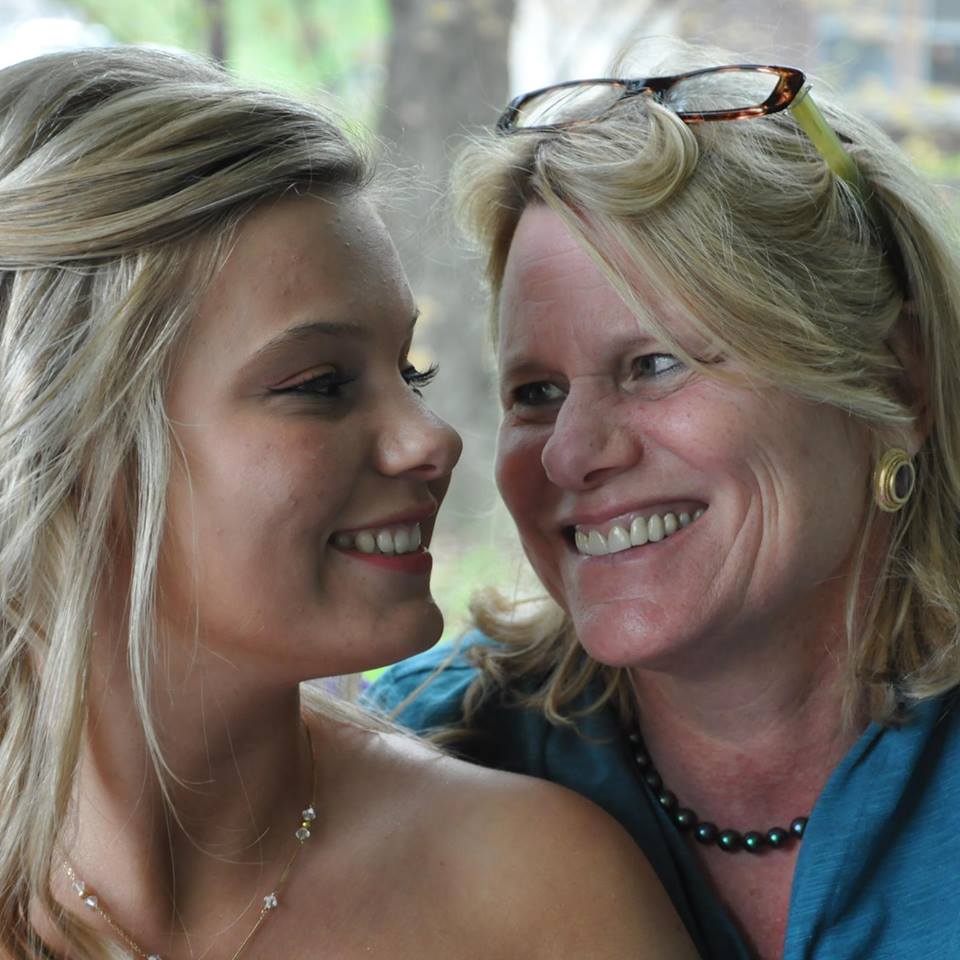 We took a few minutes to ask Susie about "summer slide" and any tips she might have for our readers--be you fans and supporters from afar, grandparents checking on your child at camp, or one of our many local followers dedicated to providing well-rounded educational experiences for your children. Here's a quick note from our co-director:
We took a few minutes to ask Susie about "summer slide" and any tips she might have for our readers--be you fans and supporters from afar, grandparents checking on your child at camp, or one of our many local followers dedicated to providing well-rounded educational experiences for your children. Here's a quick note from our co-director:
Summer is a season when children can spend more time playing, learning their own limitations, and problem solving in areas they feel drawn to. Society doesn’t allow much time for imagining anymore, but that is an important skill and we need to encourage our kids to dream. We also need to provide opportunities for our kids to develop critical thinking. At Camp Spring Creek, we want to keep our childrens' academic skills from sliding during the summer, but we value our outdoor time as much as our tutoring time.
For those reading our blog from afar, if your child has a natural interest in something, summer is perfect for devoting time to developing that interest. Be it cooking, hiking, building, or dancing—whatever their passion, there’s always a way to incorporate basic educational skills and keep it fun. This interest need not be an expensive hobby or something that requires high-tech equipment. Whatever they choose, we need to encourage our kids to dream and then reach for those dreams.
At the end of every school year, I take our children to a bookstore and let them pick a book that interests them for summer reading. If you can’t afford to buy a book, go to your local library and borrow a book. Most libraries have books on CD, which you can listen to while you’re taking a trip in the car or while you are sitting by a brook in the shade.
During the early years (and also in adult life), is important to build meaningful relationships and reflect on those relationships. We have always encouraged our children to write to family and friends during summertime and, often, they get mail in return. If a friend has moved away or a grandparent or other relative lives far away, this is a wonderful way to stay connected while also getting writing practice. Journaling is a private way to keep writing active and kids can get very creative with their journals, pasting in items and photos from different activities they have enjoyed.
In short, our golden rule: Get outside, play with friends, learn a new skill, dream, and write to your grandparents; like summer, they won’t be around forever.
Interview: Rob Langston, Author & Inspiration
 Today’s interview is with inspiring individual Rob Langston. Rob is a graduate of the University of West Georgia despite being functionally illiterate. He is a published author even though he toils to accomplish what many of us do with ease—read and write. He has conducted assemblies for more than 500,000 children in the United States, traveling 100,000 miles annually to present his powerful message. Rob is the author of For the Children: Redefining Success in School and Success in Life and The Power of Dyslexic Thinking. Since 1996, Rob has been a resource consultant to Vistage, an international organization of over fourteen thousand CEOs (many of whom also have dyslexia).
Camp Spring Creek: For those of us who aren’t CEOs or likely to run into one of your professional development sessions, can you briefly tell us about the steps you used to overcome your personal battle with dyslexia?
Today’s interview is with inspiring individual Rob Langston. Rob is a graduate of the University of West Georgia despite being functionally illiterate. He is a published author even though he toils to accomplish what many of us do with ease—read and write. He has conducted assemblies for more than 500,000 children in the United States, traveling 100,000 miles annually to present his powerful message. Rob is the author of For the Children: Redefining Success in School and Success in Life and The Power of Dyslexic Thinking. Since 1996, Rob has been a resource consultant to Vistage, an international organization of over fourteen thousand CEOs (many of whom also have dyslexia).
Camp Spring Creek: For those of us who aren’t CEOs or likely to run into one of your professional development sessions, can you briefly tell us about the steps you used to overcome your personal battle with dyslexia?
Rob Langston: Anything smarter, faster, stronger, or that can overcome obstacles is what CEO’s want. That’s what the dyslexic mind wants, too. Being dyslexic, the majority of my problems had to do with getting through school in classrooms. I looked back and realized I was going through the same 5 steps every time and I turned those steps into a three-hour program. By the end of the program, people can help themselves think like a dyslexic, if they don’t already. A high percentage of CEO’s come up to me after each program and tell me they are also dyslexic or ADHD. It’s always refreshing to have something that had been a negative thing in school turn into a really positive thing in life.
The five steps are: First, set a goal and write it down. Second, get educated on your goal (what it will take to accomplish it). The third step is what really sets this program apart, because it has to do with how to set up reinforcement for the motivation for each goal. For example, your ringtone can be an affirmation or your screen saver can be a typed message of your goal, etc. Once you set that up, the fourth step is focus. You can see the path and get what you want when no one else does. Another name for that is leadership. The fifth step is the action initiative. We take action and get started.
CSC: How do you learn best?
RL: I’m an auditory/visual learner. Because I read so poorly, every member of my family read to me when it came time to study. I could listen and absorb for longer than they could stand to read. Today, I devour audio books. Sometimes I’ll listen to the same audio book two or three times until I’m learning at full capacity and taking it into my life as something that will impact me. The repetition of listening is a very strong learning tool for me and I think it works for many others. As far as visual learning, I observe and watch everything until I feel I have visual mastery of what I want to accomplish—whether watching sports or a social situation, etc. When I am ready, I join in and I usually find great success. Today, I use many YouTube videos for everything from work-related issues to learning how to build a chair. I repeat the watching until I have visual mastery and then I’ll go do it. My main weakness is that if you hand me a manual and say, “Read this, then do it,” that’s challenging for me.
CSC: You have spoken to hundreds of thousands of youth across the country. What commonalities amongst these children and young adults do you encounter? Is there one question they all seem to ask? A set of shared concerns or misunderstandings that they have in common?
RL: My observation is that kids are kids are kids. I have spoken in schools in Harlem that hadn’t had school assemblies in 15 years because they went so poorly and we’ve had great success. I’ve also spoken in private schools in San Francisco and had success. Dyslexia is not a place or race thing; it’s a brain thing. If you talk to kids about what they’re interested in, you’ll have them. I tell them about what it was like emotionally to hide, lie, and cheat in first grade and they can relate to that.
As far as the kids asking me something, for most of them it is more about feeling so relieved that someone is talking about this struggle out loud and in a positive light. The most common thing I get is when a kid will raise his/her hand and say, “I’m dyslexic too,” in front of all their peers. I always congratulate them. That’s a powerful event for them. Finally, they don’t feel alone and are held in a positive light. This also helps the unidentified dyslexics start thinking about things and getting help or being fearless and accepted. I also talk to teachers because they’re the first line of defense.
CSC: You published your first book, For the Children, using the author name “Rob Langston, LD.”We assume the “LD” stands for learning difference, and enjoy that you included it in your title where most people include a list of their educational degrees. Can you tell us a little more about this decision and what it says about your approach to life and work?
RL: That’s part of taking ownership of who you are. Having dyslexia is a part of who I am, no matter what. My struggles with reading make me who I am. My empathy with other people who struggle with any types of challenges is part of who I am, too. The strengths that come from the way my mind works in business and life are a part of me, too. When I first got out of college and started making money, I went out and bought a shiny, red, turbo sportscar and got a specialized tag. I had the tag say: ABLE LD. I’m a learning abled person with a difference. My son has dyslexia and I want him to see the benefits to the way his brain works, too. He had early intervention and is in 3rd grade and reading at a 3rd grade level, so he has a better jump on life than I had. His creative mind is still there, too, and I’m so glad for that. Everyday, I see him using his dysxleic mind right alongside his reading mind.
CSC: You’ve blogged for Psychology Today about being a “techno dyslexic” and, specifically, how your GPS unit saves you throughout your travels. Are there any other tools you “can’t live without,” technological or otherwise? If so, what are they and how have they become so important in your life?
RL: Today, we have voice recognition technology. You pick up any iPhone or Android phone and the little microphone is right there to press and tell what to do. It’s a more efficient way of working. I can also dictate into my phone while I’m driving and I’ve done that for entire books that I’ve written. Just recently, I started using the calendar function on Macs a lot. Dyslexics can be disorganized at times, to say the least. I switched everything over to Mac and iCloud and everything syncs no matter what device I have with me at the time. My son is involved in project-based learning in school and he’s used the iPad for that twice now. It’s really nice because there are so many apps that can help him with spelling and writing.
YouTube is also a huge technological resource. I do lots of editing and I utilize that as a technology advantage everyday because it like the audio/visual way of taking in information as well. There’s a lot of other help out there, but it’s text-based. Now that I’m all Mac-based, I find myself using the text-to-voice reader a lot and that helps utilize those text-based sites. Social/visual media is also so accessible. What I do at dyslexia.com couldn’t have been done 3 years ago because the broadband wasn’t available. Now, we broadcast in 34 countries. I’m proud of reaching 500,000 kids live in the school system, but, online, things are unlimited and available on every SmartBoard for every teacher that wants it.
A Message from Jeanne Betancourt
 Today we are pleased to publish this message from author, artist, teacher, and inspiring individual Jeanne Betancourt. Jeanne has been honored by the Kildonan School and also received the 2004 Life Achievement Award from the Hamilton School at Wheeler. Jeanne has taught in junior and senior high schools and was on the graduate faculty of the Media Studies Program at the New School for Social Research. She has served as a consultant, speaker, and workshop leader on adolescents, writing, and the media, and is a past president of New York Women in Film and Television. Her website offers a wealth of resources and we encourage you to check it out.
Today we are pleased to publish this message from author, artist, teacher, and inspiring individual Jeanne Betancourt. Jeanne has been honored by the Kildonan School and also received the 2004 Life Achievement Award from the Hamilton School at Wheeler. Jeanne has taught in junior and senior high schools and was on the graduate faculty of the Media Studies Program at the New School for Social Research. She has served as a consultant, speaker, and workshop leader on adolescents, writing, and the media, and is a past president of New York Women in Film and Television. Her website offers a wealth of resources and we encourage you to check it out.
I took my first tap class when I was six-years-old, the same year I was supposed to learn to read and spell. I loved my Saturday morning classes in Miss Irene’s studio above a storefront in downtown Rutland, Vermont. When Miss Irene realized I was having trouble following her right foot/left foot directions, she put a red ribbon on my right tap shoe. I am convinced that my 12 years of tap classes as a kid and the tap classes I take today help me with my dyslexia. My feet learn what to do and which foot does what. While the beat goes on, my brain easily identifies right and left as I learn dance steps and routines.
People are often surprised to learn that I am dyslexic. They think that being dyslexic would prevent me from being a successful writer. I believe that being dyslexic has helped me as a writer.
Since learning to read and write was difficult for me growing up, I paid more attention to the world around me. I took clues to what people were thinking and feeling from their speech and body language. Today, as an author, it is easy for me to imagine what it would be like to be in someone else’s shoes. Being able to put yourself in another person’s place and understand how they feel is a key to being a good writer. I also have strong visual memories and can easily imagine the places I’ve been as I describe them for the reader. These skills are more important for me as a storyteller than the skills I don’t have because I am dyslexic—like being a good speller and a speedy reader.
The story I wrote in MY NAME IS BRAIN BRIAN follows Brian’s adventures, friendships, and family life before and after he learns that he is dyslexic. By the end of the story, he realizes that the mistake he made spelling his name on the board the first day of sixth grade is true. He is a Brain.
Anna, in a series I wrote called The Pony Pals, is also dyslexic. In every book, I remind my readers about that. Anna doesn’t like school as much as Pam and Lulu. When they write their ideas for solving Pony Pal Problems, Anna draws hers. Like many dyslexics, she has artistic talent. Anna’s dyslexia is a big part of the plot for two of the Pony Pal books, #2: A PONY FOR KEEPS and #38: PONIES ON PARADE.
I hope that my personal story and novels help dyslexics of all ages recognize their own strengths. And that the people in their lives—teachers, parents, friends—acknowledge that we all have individual learning styles. Here is my twist on the American proverb: “You can’t tell a book by its cover.” You can’t tell a child’s potential by how easily they learn to read.
Interview: Dr. Keeney, "Hero Award" Recipient & More
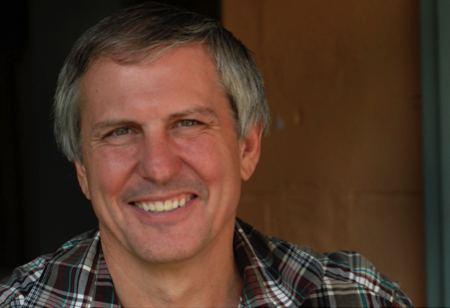 Today’s interview is with inspiring individual Dr. William Keeney. Bill is the English Department Chair and has taught English at Delaware Valley Friends School for over a decade. Bill has a strong interest in educational research and pedagogy and was featured in the HBO documentary, Journey Into Dyslexia. He has published poetry, plays, and scholarly articles in American Literature, and presents on reading at national conferences such as the IDA. He was awarded the West Chester Public Library's Literacy Hero Award in 2007. Bill earned his B.A. at Columbia University and his M.A. and Ph.D. at Boston University, where he studied with Nobel Laureate Derek Walcott.
Camp Spring Creek: We were so moved by your classroom demeanor and educational philosophy in the HBO documentary, Journey Into Dyslexia. For our readers who have not seen the video, would you mind summarizing your points?
Today’s interview is with inspiring individual Dr. William Keeney. Bill is the English Department Chair and has taught English at Delaware Valley Friends School for over a decade. Bill has a strong interest in educational research and pedagogy and was featured in the HBO documentary, Journey Into Dyslexia. He has published poetry, plays, and scholarly articles in American Literature, and presents on reading at national conferences such as the IDA. He was awarded the West Chester Public Library's Literacy Hero Award in 2007. Bill earned his B.A. at Columbia University and his M.A. and Ph.D. at Boston University, where he studied with Nobel Laureate Derek Walcott.
Camp Spring Creek: We were so moved by your classroom demeanor and educational philosophy in the HBO documentary, Journey Into Dyslexia. For our readers who have not seen the video, would you mind summarizing your points?
Bill Kenney: Not being able to read is not your fault. One in five people have trouble learning to read if they are not taught well. This is because of a specific part of your brain that is different from the “norm” but is NOT the same as a difference in intelligence. You can have superior intelligence and still not be able to read without effort. If you didn’t get taught well, that is the fault of the educational system that didn’t get you the help you need and deserve. (If you are at Camp Spring Creek, count your blessings because they will be able to teach you to read the right way.) Even if you were taught to read, reading still might be a struggle because of how your brain processes writing into oral language. Because our current society is so dependent on text, you do have to read well enough to get by. Fortunately, there are some pretty good technological aids that you can use that will help you get through, such as audio books (particularly Learning Ally, especially for schoolwork) and text-to-speech tools. However, even if reading remains a struggle for you, you can still live a productive, successful, and happy life using your other gifts and talents.
CSC: We understand that, despite stereotypes, many children with dyslexia come to love reading and stories. When teaching required texts in a mandatory education setting, we’re curious about what you see on “the front lines” and how you address that. As an English teacher at a school specializing in dynamic learning experiences for students with learning differences, some might think that you have “the hardest subject” to teach. What kinds of resistance do you face in the classroom and how do you work with that?
BK: The key to getting “buy-in” is hope. It begins by “de-mystifying” the problem by explaining its origin in scientific terms and re-assuring the students that reading and intelligence are two very different things, and the fact that they might be struggling to learn to read is not their fault. However, I also emphasize that learning to read is a very core skill, and that with effort and skilled instruction, they can learn to read better and with less effort. I am honest that it will take time and hard work, and that they may never become readers who “enjoy” reading, but they can become readers for whom the value of reading and what reading brings into their lives can be a reality. Finally, I provide audio (with variable speed playback so that they can listen along faster, if they can process it) so that they can have access to books that are at grade level even if their reading is not there yet.
CSC: As a lover of literature and writer yourself, can you tell us about a peak learning experience you had growing up—something that involved realizing how much you loved stories or how you discovered the power of literature? Feel free to share some of your favorite book titles with us from childhood to present day!
BK: I was blessed with the ability to read easily from a young age, so I began reading everything from a young age, so I don’t know if my story is going to resonate with people who struggle to read, but I am glad to share it. I remember the first time I “fell through a book.” I was sitting in an armchair and suddenly was just effortlessly reading. My memory is that the book was called Ab the Caveman, although I have looked for it since and have never been able to locate a copy. In my youth, I devoured comic books, sports stories, science fiction, horror, etc.
Then, in my senior year of high school, I read Robert Penn Warren’s novel, All the King’s Men. I remember thinking: This is a book that was not written for me, it is not about a world I know anything about, but it is absolutely compelling, rich, and insightful—this is what literature is all about. In college I began to enjoy poetry such as Walt Whitman, Emily Dickinson, WB Yeats, TS Eliot, and Wallace Stevens.
Some of the things I have read most recently that I love to recommend are: Paul Harding’s Tinkers, Annie Proulx’s short stories, and Charles Frazer’s Cold Mountain. However, I don’t think what I read is necessarily what someone decades younger than I should read! For young adults, I think The Hunger Games is the best of these kind of series, I always recommend To Kill a Mockingbird and Catcher in the Rye for high school students, and many students in my school love The Alchemist and The Absolutely True Diary of a Part-time Indian.
But my final word would be: Find your own book recommenders. Read what your friends have read and liked. Read several books by the same author or in the same genre. Your teachers will probably introduce you to “classics” like The Great Gatsby, but on your own, explore. Read widely. It doesn’t matter nearly so much what you read as whether you read!
CSC: Camp Spring Creek feels strongly that the Orton-Gillingham approach can be beneficial to all types of learners, not just children with dyslexia or other learning differences. We also stand behind the belief that this approach can be integrated successfully into the public school and home learning environments, with proper training and information. For our parents or teachers with children at home, can you share a basic technique or skill that you teach in your English literature classroom? Perhaps something that could easily transfer into the home or public school learning environments such as a word game, a reading challenge, or some other exercise…whatever comes to mind.
BK: You are correct that good, systematic teaching is beneficial to everyone, particularly when it comes to the basic skill of reading. Research shows that there is only one pathway in the brain to efficient reading, and that everyone who learns to read builds those same neural networks—some just build them faster and with less effort, but the process is exactly the same. So, if we all teach all students in explicit, multi-sensory, structured and systematic ways, everyone will learn to read as quickly and as well as they possibly could! My motto is, this isn’t special education, it’s education by specialists—“It’s just good teaching.”
Since I teach in a high school and primarily with literature, I have two basic pieces of advice: If you still have difficulty reading, use audio as a support to help your speed, accuracy, fluency, and comprehension; and, for comprehension, re-read. This is what all readers do to improve their comprehension; it is just that “natural” or skilled readers can do this quickly and efficiently (as well as having the freed-up space in their minds to monitor their comprehension because the reading process has faded into automatic).
Interview: Esteemed Author Amanda Kyle Williams
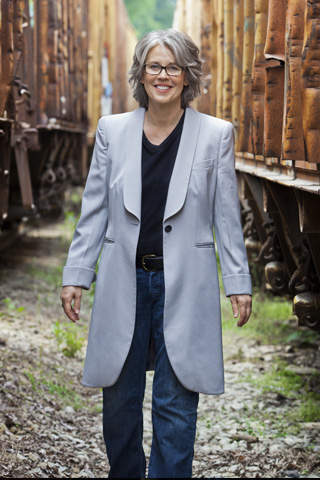 Today’s interview features author and inspiring individual Amanda Kyle Williams. Amanda is the author of the The Stranger You Seek, Stranger In The Room and Don’t Talk To Strangers (July 1st). The Random House thriller series is set in Atlanta and features former FBI criminal analyst turned private investigator and police consultant, Keye Street. Williams was diagnosed with dyslexia at age 22 and read her first book at 23 years old. The journey from struggling to read to becoming a full time writer is one she now speaks about publicly in hopes her story will inspire others with learning differences.
Camp Spring Creek: Many people hear the word “dyslexia” and the last thing they think is “accomplished writer.” How do you respond to this preconception? Are there tools or techniques you employ as a writer with dyslexia that you find especially assistive?
Today’s interview features author and inspiring individual Amanda Kyle Williams. Amanda is the author of the The Stranger You Seek, Stranger In The Room and Don’t Talk To Strangers (July 1st). The Random House thriller series is set in Atlanta and features former FBI criminal analyst turned private investigator and police consultant, Keye Street. Williams was diagnosed with dyslexia at age 22 and read her first book at 23 years old. The journey from struggling to read to becoming a full time writer is one she now speaks about publicly in hopes her story will inspire others with learning differences.
Camp Spring Creek: Many people hear the word “dyslexia” and the last thing they think is “accomplished writer.” How do you respond to this preconception? Are there tools or techniques you employ as a writer with dyslexia that you find especially assistive?
Amanda Kyle Williams: First of all, the perception that dyslexia is a disability creates more hurdles for a person with dyslexia than dyslexia itself. It’s a learning difference. That’s all. Apart from difficulties with the written word, we have learned that people with dyslexia are critical thinkers who think and perceive multi-dimensionally. Dyslexics have the gift of imagination, of intuition, of curiosity, and acute visual awareness and memory. Other writers sometimes ask me how I can write with dyslexia, and I always think; how can you write without it? Dyslexia isn’t a deal breaker. It comes with challenges, yes, but it comes with gifts as well. For me personally, dyslexia gave me a way of listening, of hearing, of finding the rhythm and music in the spoken word. Long before I had learned to read, I was a student of language, a mimic, a listener. This would serve me well as a writer of dialogue later in life. And when I was finally given the tools to learn to read, when I was told for the first time that it wasn’t intelligence I lacked, I began to discover literature and it was transformative. I had found that same music in books and words that I’d heard all my life.
Yes, I will always, always be a slow reader. Sometimes that means I’m a slow learner. But I’m a thorough one. And because I am so visual, I see my work in pictures as I write, in scenes—something else that serves me well. I want to be very clear. I wasn’t suffering from dyslexia before I was diagnosed. I was slamming into walls erected by a system that didn’t understand or accommodate for it. Dyslexia isn’t my burden. It’s my gift. All gifts come with responsibilities and challenges. What I want to say to everyone who has struggled to learn, struggled with the perception of others, watched their children struggle, is that the key for me has been to recognize the natural talents that set us apart as dyslexics and focus on developing them. So we’re slow readers. So what? Once we are able to read, we do it with the kind of clarity and absorbency that is another gift of dyslexia.
CSC: You and Camp Spring Creek co-director Susie van der Vorst recently met at the Georgia IDA Conference. Tell us a little bit about what you presented there regarding your own story with dyslexia:
AKW: It was a great honor to be asked to speak at IDA. For me, in a way, it felt like some far off mountaintop. There was a time in my life that I couldn’t have imagined myself doing anything beyond toiling to buy the groceries and protecting the biggest, darkest secret I’d ever had—that I couldn’t deal with long text. I could read you a sentence when I dropped out of school at 16. I could spell words. But string them together into paragraphs and pages and my recognition and comprehension went out the window. It was a kind of jigsaw puzzle for me, reading, and it was one that didn’t begin to piece itself together until I was diagnosed at 22 years old. I read my first book cover-to-cover at age 23.
CSC: You’ve held jobs in more than half a dozen different fields, from textiles to pets to private investigations. How did you find your way to writing, and at what point along that journey did you first identify as “a writer”?
AKW: [laughing] My resume is a great example of someone incapable of holding down a job, isn’t it? Well, let me first say that you have to work a lot to pay the rent when you don’t have a formal education. I did the kinds of jobs I could do without a diploma or a college education. I bluffed my way into some of them. We get good at bluffing when we’re hiding big secrets. Dyslexia wasn’t something I talked about for most of my life because it was surrounded by a lot of shame when I was a kid. I wasn’t performing the way my peers were performing. Words like "slow," "stupid," and "doesn’t apply herself" were the everyday norm for me. Takes a while to shake that. Even after I was diagnosed, I shared it only with my family. Most of my friends had no idea at all until I began to speak publicly about my experiences. I had a job as a courier in Atlanta for a time and they’d give you those huge street maps. There were days it was a complete jumble to me. I think I used more gas than anyone else on the team trying to find delivery addresses.
I actually started writing about 5 years after I learned to read. Inexplicably, words and sentences, the things that had turned my young life into a secretive little cave, just wouldn’t let me go. I wrote my first book at 28. It wasn’t very good. The next 3 weren’t any good at all. It would take me many years of nurturing the craft and working odd jobs to support my writing habit before my work was strong enough and honest enough to have some commercial success.
CSC: It can take years for writers to find and hone their own voice so that it becomes uniquely, undeniably theirs. The same might also be said for someone living with undiagnosed or unsupported dyslexia—it can take years for him or her to feel as though their individual voice has a place and audience in society. Why do you think that is and what advice do you have for someone in this situation?
AKW: I lived in that undiagnosed, unsupported world for many years. When you grow up feeling less than, feeling dumb, being told you’re not trying or not smart enough to do what is asked of you in school, it marks you. It just does. This is why it’s so important that educators understand and accommodate for the symptoms of dyslexia. Everything started to turn for me the day I was diagnosed, the day I learned there was a name for me, an explanation, and it wasn’t "slow" or "stupid." I was told for the first time I could learn, that I was smart even though I’d tested impossibly low on standardized testing in school. The diagnosis changed every way I felt about myself and every way I felt about my chances in the world. "Dyslexia" was about the most beautiful word I’d ever heard.
Recently, just for fun, I took another IQ test. Guess what? I scored impossibly low. I write police procedurals. I plot murder mysteries. I regularly speak to forensic scientists and pathologists and psychologists and physicians who consult on my books. But I’m somewhere in the idiot range on IQ tests. I guess I would say to anyone who struggles to learn and to read, to first remain calm. Because when you panic and you’re stressed out, the world turns into a giant crossword puzzle. It takes support, patience and persistence. Secondly, find the tools to tackle it. There are organizations now with systems for learning for children and adults that didn’t exist when I was a kid in school. I’m now 56 years old. Find those tools, use them, don’t be afraid to ask for help, and know that you have all the talent and intelligence of your peers.
So, you’re a square peg in a round hole. Embrace it and let yourself soar. I’m not diminishing the challenges. You have to want it. You have to be prepared to study and practice with the tools available. It can be frustrating and slow. It takes persistence. But the point is, you are no less capable than anyone else. It’s a matter of tapping it. And the truth is, all independently successful people have had to work their butts off in this world. All of them. And not all of them had the added gifts that come with dyslexia. So go for it.
CSC: If you have children of your own or young people in your life that you are close to, how have your experiences as a child influenced the role and influence you strive to have in their lives?
AKW: What I want every child and every adult who struggles to learn to know, is that not only is it possible to learn to read, to comprehend, to enjoy reading, to be a functioning contributor to society, and even to love literature, to get great jobs, to follow your bliss—it’s also possible to soar, to reach any height. You have as much opportunity and capability as everyone else. You walk through a different door to get there. That’s all. Just kick it open and get there.
And what I want to say to educators, especially those in the public school system, is if you have children who seem intelligent and are not performing, please look a little deeper and find out about learning differences, because sometimes all a child needs is opportunity and the accommodation of time to fully blossom.
Last Child in the Woods by Richard Louv
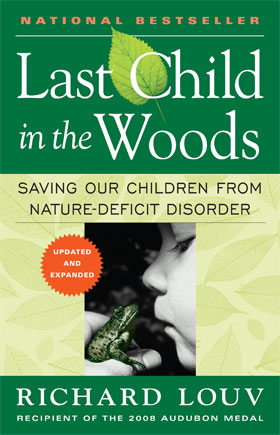 This week we're recommending Last Child in the Woods, an incredible book by Richard Louv. According to the author's website: "In this influential work about the staggering divide between children and the outdoors, child advocacy expert Richard Louv directly links the lack of nature in the lives of today's wired generation—he calls it nature-deficit—to some of the most disturbing childhood trends, such as the rises in obesity, attention disorders, and depression. Last Child in the Woods is the first book to bring together a new and growing body of research indicating that direct exposure to nature is essential for healthy childhood development and for the physical and emotional health of children and adults. More than just raising an alarm, Louv offers practical solutions and simple ways to heal the broken bond—and many are right in our own backyard."
You can also check out a video about the inspiration for Last Child right here.
This week we're recommending Last Child in the Woods, an incredible book by Richard Louv. According to the author's website: "In this influential work about the staggering divide between children and the outdoors, child advocacy expert Richard Louv directly links the lack of nature in the lives of today's wired generation—he calls it nature-deficit—to some of the most disturbing childhood trends, such as the rises in obesity, attention disorders, and depression. Last Child in the Woods is the first book to bring together a new and growing body of research indicating that direct exposure to nature is essential for healthy childhood development and for the physical and emotional health of children and adults. More than just raising an alarm, Louv offers practical solutions and simple ways to heal the broken bond—and many are right in our own backyard."
You can also check out a video about the inspiration for Last Child right here.
Square Peg: My Story and What It Means for Raising Innovators, Visionaries, and Out-of-the-Box Thinkers by Todd Rose
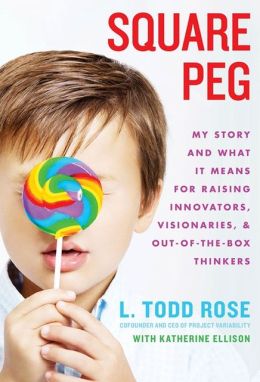 Susie just finished reading this book and highly recommends it. Check out author Todd Rose's page at Harvard or read this from Amazon and see for yourself:
"In the seventh grade, Todd Rose was suspended--not for the first time--for throwing six stink bombs at the blackboard, where his art teacher stood with his back to the class. At eighteen, he was a high school dropout, stocking shelves at a department store for $4.25 an hour. Today, Rose is a faculty member at the Harvard Graduate School of Education. Square Peg illuminates the struggles of millions of bright young children--and their frustrated parents and teachers--who are stuck in a one-size-fits-all school system that fails to approach the student as an individual. Rose shares his own incredible journey from troubled childhood to Harvard, seamlessly integrating cutting-edge research in neuroscience and psychology along with advances in the field of education, to ultimately provide a roadmap for parents and teachers of kids who are the casualties of America's antiquated school system. With a distinguished blend of humor, humility, and practical advice for nurturing children who are a poor fit in conventional schools, Square Peg is a game-changing manifesto that provides groundbreaking insight into how we can get the most out of all the students in our classrooms, and why today's dropouts could be tomorrow's innovators."
Susie just finished reading this book and highly recommends it. Check out author Todd Rose's page at Harvard or read this from Amazon and see for yourself:
"In the seventh grade, Todd Rose was suspended--not for the first time--for throwing six stink bombs at the blackboard, where his art teacher stood with his back to the class. At eighteen, he was a high school dropout, stocking shelves at a department store for $4.25 an hour. Today, Rose is a faculty member at the Harvard Graduate School of Education. Square Peg illuminates the struggles of millions of bright young children--and their frustrated parents and teachers--who are stuck in a one-size-fits-all school system that fails to approach the student as an individual. Rose shares his own incredible journey from troubled childhood to Harvard, seamlessly integrating cutting-edge research in neuroscience and psychology along with advances in the field of education, to ultimately provide a roadmap for parents and teachers of kids who are the casualties of America's antiquated school system. With a distinguished blend of humor, humility, and practical advice for nurturing children who are a poor fit in conventional schools, Square Peg is a game-changing manifesto that provides groundbreaking insight into how we can get the most out of all the students in our classrooms, and why today's dropouts could be tomorrow's innovators."
Proust & the Squid: The Story & Science of the Reading Brain by Maryanne Wolf
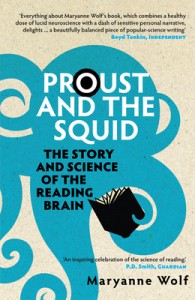 This month, we're recommending Proust and the Squid: The Story and Science of the Reading Brain by Maryanne Wolf. Featured on the Journey Into Dyslexia short film, Wolf reminds us that "Reading is one of the newest inventions of our species." According to the book page description, "'Human beings were never born to read,' writes Tufts University cognitive neuroscientist and child development expert Maryanne Wolf. Reading is a human invention that reflects how the brain rearranges itself to learn something new. In this ambitious, provocative book, Wolf chronicles the remarkable journey of the reading brain not only over the past five thousand years, since writing began, but also over the course of a single child's life, showing in the process why children with dyslexia have reading difficulties and singular gifts. Lively, erudite, and rich with examples, Proust and the Squid asserts that the brain that examined the tiny clay tablets of the Sumerians was a very different brain from the one that is immersed in today's technology-driven literacy. The potential transformations in this changed reading brain, Wolf argues, have profound implications for every child and for the intellectual development of our species." We highly recommend this book! Here's an excerpt from Chapter One to get you started!
This month, we're recommending Proust and the Squid: The Story and Science of the Reading Brain by Maryanne Wolf. Featured on the Journey Into Dyslexia short film, Wolf reminds us that "Reading is one of the newest inventions of our species." According to the book page description, "'Human beings were never born to read,' writes Tufts University cognitive neuroscientist and child development expert Maryanne Wolf. Reading is a human invention that reflects how the brain rearranges itself to learn something new. In this ambitious, provocative book, Wolf chronicles the remarkable journey of the reading brain not only over the past five thousand years, since writing began, but also over the course of a single child's life, showing in the process why children with dyslexia have reading difficulties and singular gifts. Lively, erudite, and rich with examples, Proust and the Squid asserts that the brain that examined the tiny clay tablets of the Sumerians was a very different brain from the one that is immersed in today's technology-driven literacy. The potential transformations in this changed reading brain, Wolf argues, have profound implications for every child and for the intellectual development of our species." We highly recommend this book! Here's an excerpt from Chapter One to get you started!
